In this article:
Niacinamide and vitamin C are both popular skin care ingredients found in several beauty products.
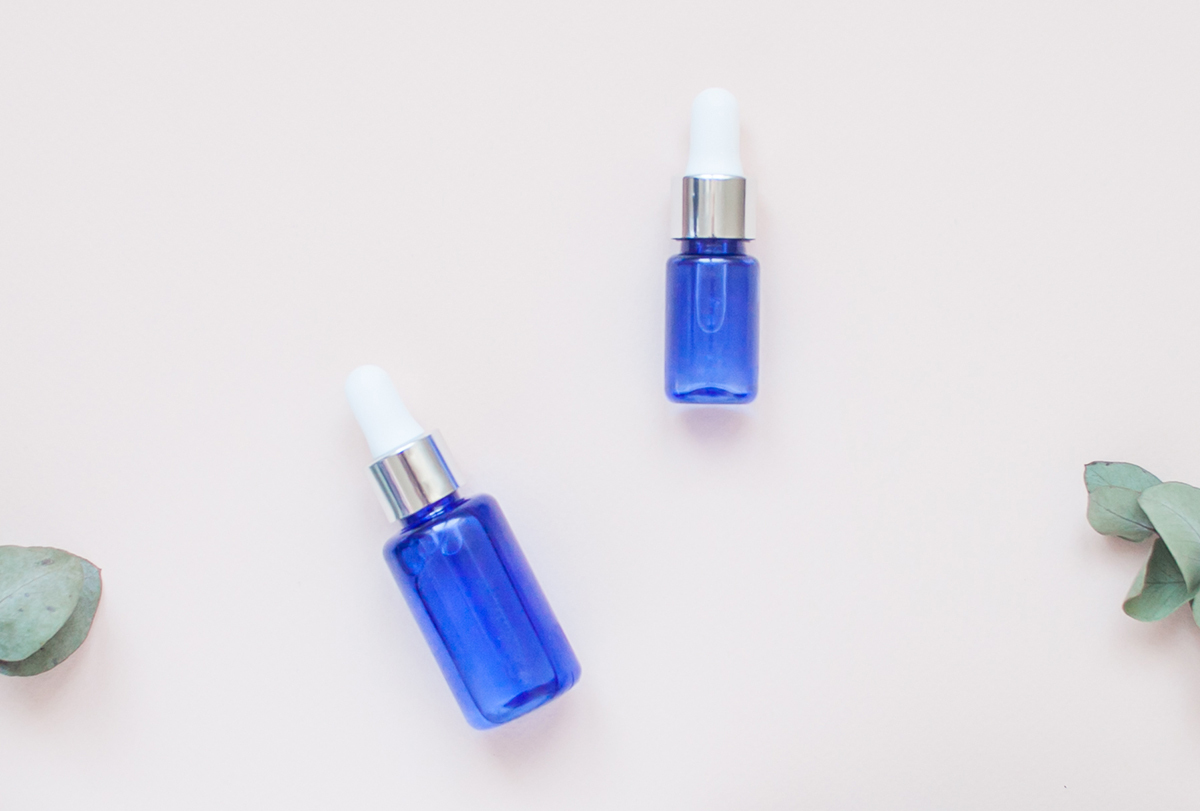
While both are touted as excellent remedies individually, several myths surround the use of niacinamide and vitamin C together. Some sources state that they negate each other’s effects, while others suggest that using the two together can cause skin irritation.
However, there is no scientific evidence behind these claims. This article will take a deeper look at the issue.
Can Niacinamide and Vitamin C Be Used at the Same Time?
Yes. You can actually use both niacinamide and vitamin C in your skin care routine without fear of any adverse effects. Recent studies indicate that both these ingredients may work together to improve your skin health and brighten your skin tone. (1)
All the claims about the ill effects of combining these two ingredients stem from research studies published in the 1960s. They showed that ascorbic acid and niacinamide combined to form nicotinic acid in the lab.
However, the vitamin C formulations used in skin care products are way more stable and less concentrated than ascorbic acid, and such reactions are not possible in normal conditions. Hence, the aforementioned research studies are outdated and inaccurate. (2)
Thus, you can use a single product containing niacinamide and vitamin C or use different products by layering them.
What Is Niacinamide and What Are Its Benefits?
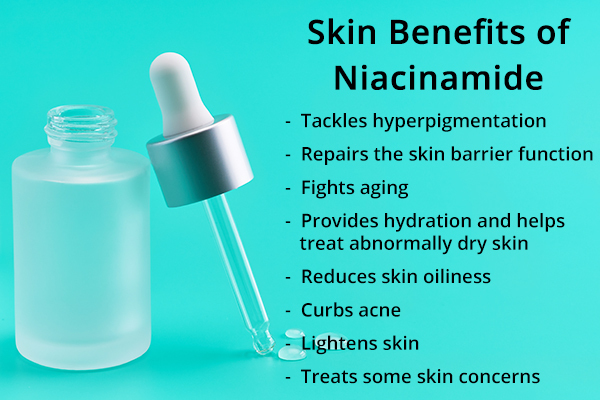
Niacinamide is a derivative of vitamin B3. (3) It is a natural compound found in many plants and animals. It is a potent antioxidant that protects the skin from free radical damage and photodamage, making it look younger and fresher. (4)
Moreover, niacinamide is a water-soluble vitamin and helps hydrate the skin deeply. It is known for rejuvenating the skin and clearing away blemishes, dark spots, and wrinkles. (5)
A lot of skin benefits are associated with the use of niacinamide. Some of them are:
- Tackles hyperpigmentation: Niacinamide is known to lighten dark spots and treat hyperpigmentation due to its antioxidant properties. (6)
- Repairs the skin barrier function: Niacinamide stimulates ceramide production and collagen production in the skin and also keeps it hydrated. (7)
- Fights aging: The antioxidant properties of niacinamide help fight the signs of aging – wrinkles and fine lines. It also stimulates collagen production that helps treat saggy skin. (8)(9)
- Provides hydration and helps treat abnormally dry skin: 2% niacinamide has proven to be more effective in hydrating the skin than other over-the-counter moisturizers and Vaseline. (10)(11)
- Reduces skin oiliness: Niacinamide can help control sebum production and reduce pore size. (12)
- Curbs acne: Niacinamide has strong anti-inflammatory properties that help clear acne. Some studies indicate that 4% niacinamide is as useful as a mild topical antibiotic when it comes to acne treatment. (13)
- Lightens skin: Niacinamide has antioxidant properties that help clear skin discoloration and hyperpigmentation. (14)
- Treats some skin concerns: Niacinamide can be helpful in treating skin conditions that cause inflammation and irritation, such as dermatitis and rosacea, due to its antioxidant, anti-inflammatory, and hydrating properties. (15)
What Is Vitamin C and What Are Its Benefits?
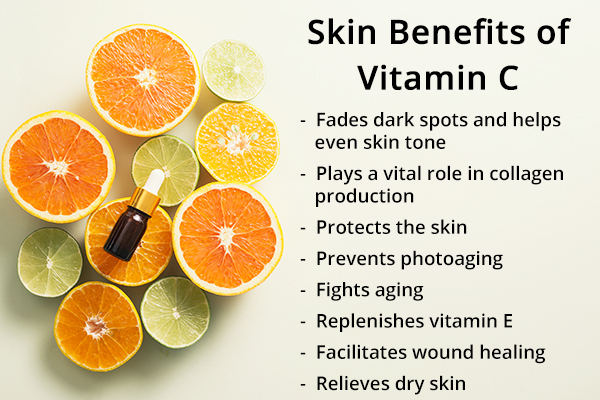
Vitamin C is an essential vitamin required for many different bodily functions. It is highly beneficial for the skin and helps keep it bright, blemish-free, and soft. (16)
Vitamin C is found in citrus fruits, berries, and green leafy vegetables such as kale and spinach. (17)(18) It is not naturally synthesized by the body and hence needs to be supplemented via your diet.
Topical application of vitamin C (10–20%) can help treat a variety of skin issues. (19)(20)
The benefits of vitamin C application include: (21)
- Fades dark spots and helps even skin tone: Topical application of vitamin C helps fight hyperpigmentation and dark spots. (22)
- Plays a vital role in collagen production: Vitamin C helps stabilize collagen levels in the body and protects it from degradation. (16)
- Protects the skin: Vitamin C is a powerful antioxidant that can protect the skin against free radical damage. (17) It is also known for its anti-inflammatory properties. (18)
- Prevents photoaging: Vitamin C has antioxidant properties that can protect the skin from the damage caused by exposure to UV rays. (17)(19)
- Fights aging: Vitamin C helps delay the signs of aging by reducing elastin levels in the skin, which prevents wrinkles, fine lines, and saggy skin. (17)(20)(23)(24)
- Replenishes vitamin E: Vitamin C also helps replenish levels of vitamin E. (17)
Facilitates wound healing: Vitamin C is known to promote wound healing and fading of scars. (25) - Relieves dry skin: Vitamin C helps moisturize the skin deeply and can be an effective cure for dry skin. (26)
How to Layer Niacinamide and Vitamin C
Here are a few ways to use vitamin C and niacinamide together:
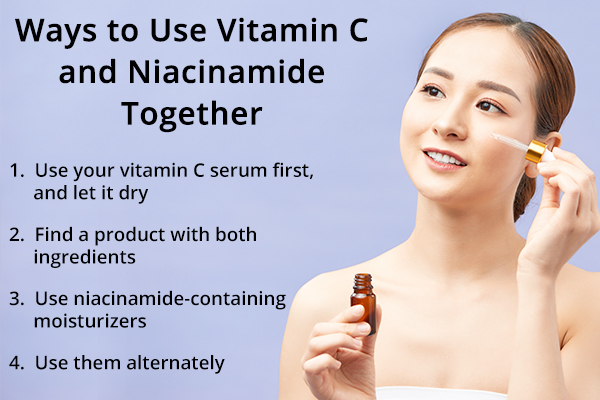
1. Use your vitamin C serum first, and let it dry.
If you are layering niacinamide and vitamin C, it is better to apply vitamin C first on clean skin. Let it dry for a couple of minutes before applying niacinamide.
2. Find a product with both ingredients.
You can use a serum or cream containing both ingredients. There are several combination products available on the market.
3. Use niacinamide-containing moisturizers.
Nowadays, niacinamide can also be found in moisturizers and toners. Since it is water-soluble and increases skin hydration, it may be a good idea to use a moisturizer containing niacinamide.
4. Use them alternately.
You can follow the AM/PM routine in the application of vitamin C and niacinamide. Apply one product in the morning and the other in the evening.
What Kind of Products Are Most Effective?
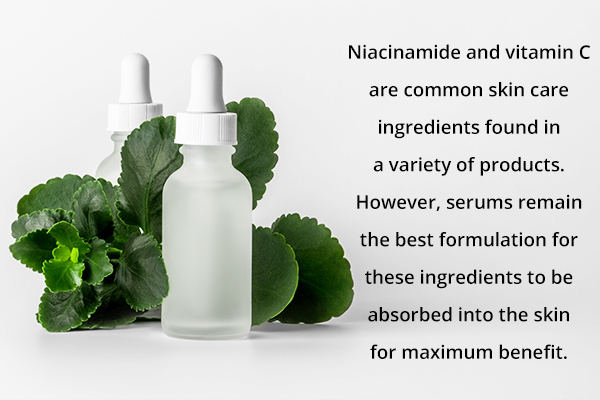
Niacinamide and vitamin C are common skin care ingredients found in a variety of products including serums, moisturizers, cleansers, and toners.
However, serums remain the best formulation for these ingredients to be absorbed into the skin for maximum benefit. Both vitamin C and niacinamide are water-soluble and easily absorbed in serum form.
Ideally, the niacinamide concentration should be 2%–10%, whereas vitamin C can be found in the range of 5%–10%.
Precautions When Using Niacinamide and Vitamin C Serum
Here are some precautions you can follow when using niacinamide and vitamin C:
- Always perform a patch test before applying anything on your face or skin.
- Remember to cleanse your face before applying any serums.
Side Effects of Using Niacinamide and Vitamin C Together
There are a few uncommon side effects associated with the use of niacinamide and vitamin C. They are:
- Allergic reactions: hives, skin irritation, swelling, etc., especially when overused or applied in high concentrations
- Mild redness in some people when using vitamin C
Should You Layer Niacinamide Before or After Vitamin C?
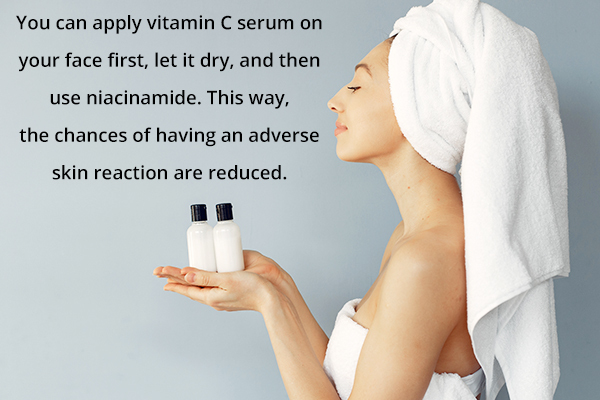
You can apply vitamin C serum on your face first, let it dry, and then use niacinamide. This way, the chances of having an adverse skin reaction are reduced.
Final Word
Niacinamide and vitamin C are completely safe to use together and are, in fact, beneficial for your skin. You can use a single product containing both ingredients or layer them.
If you have sensitive skin, you may want to use one in the morning and the other in the evening.
- Was this article helpful?
- YES, THANKS!NOT REALLY


